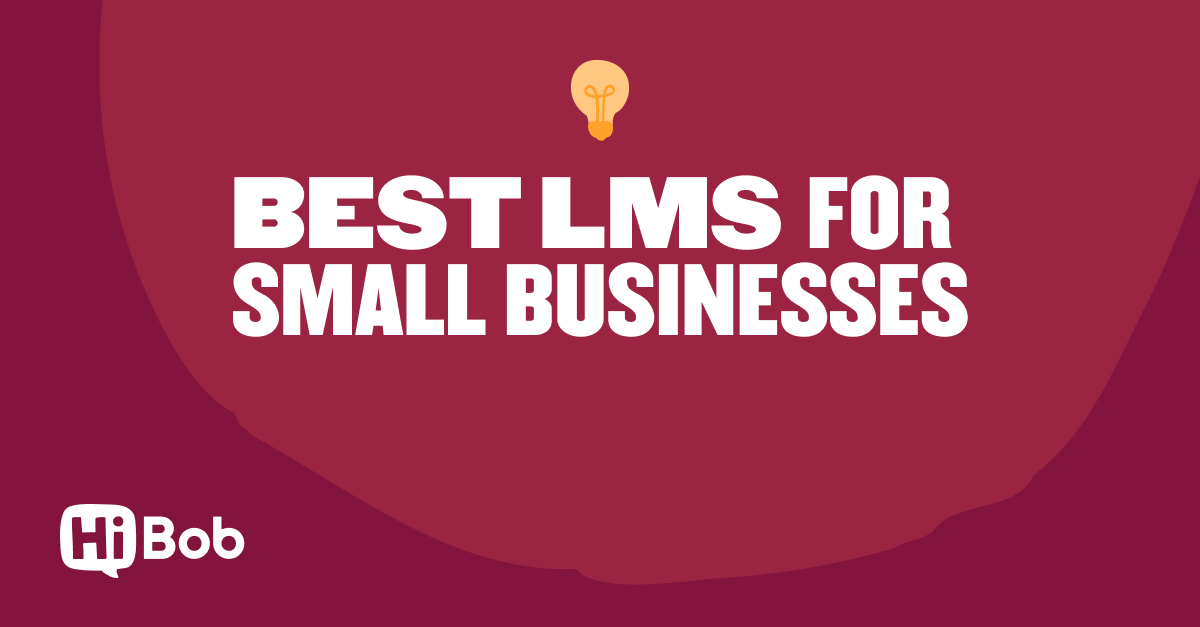
Keeping your team skilled and engaged is essential for small businesses. It helps overcome challenges like scaling operations and addressing skill gaps while unlocking opportunities for growth and innovation. In fact, 76 percent of professionals say they’re more likely to stay with companies that prioritize continuous learning and development.
For small businesses, creating a culture of learning starts with the right tools. A learning management system (LMS) is one of the most effective ways to provide accessible, organized, and impactful training, helping your team grow alongside your business.
In this guide, we’ll highlight some of the best LMS platforms designed specifically for small businesses. While these recommendations are a great starting point, we encourage you to explore and choose the platform that best fits your team’s unique needs.
Disclaimer: The opinions expressed here are solely those of the author and do not necessarily reflect the views of the company. Prospective users are encouraged to conduct their own research to make the best decision for their organization.
Best LMS for small businesses: Quick overview
Companies use learning management systems to train and educate their people, clients, and business partners. These tools provide a one-stop shop for educational content that can be live or recorded so people in different locations, time zones, and companies can easily access it.
This centralized approach makes it simple to deliver consistent, accessible training experiences while saving time and resources. Here are some of the best LMS platforms that help small businesses streamline and enhance their learning and development processes.
- HiBob
- 360 Learning
- Absorb LMS
- BrainCert
- Coassemble
- Continu
- Cypher Learning
- D2L Brightspace
- Deel
- Docebo
- EasyLMS
- Gurucan
- iSpring Learning
- LearnUpon
- LearnWords
- Litmos
- Moodle
- TalentCards
- Talent LMS
- Thinkific
- Tovuti LMS
Disclaimer: The opinions expressed here are solely those of the author and do not necessarily reflect the views of the company. Prospective users are encouraged to conduct their own research to make the best decision for their organization.
Does a small business need an LMS?
Small businesses that invest in a strong LMS, enjoy access to benefits such as:
- Consistent onboarding experiences: HR leaders can use an LMS to create a seamless, high-quality onboarding process, ensuring new joiners feel confident and equipped with the right skills from day one.
- Unified training resources: An LMS centralizes all training content, making it easy for HR leaders and team members to find and use what they need quickly.
- New skill development opportunities: New hires without growth paths may lose motivation and seek opportunities elsewhere. An LMS makes it easier for you to tailor training paths and reinforce higher engagement.
- Managed compliance requirements: Manually tracking compliance for global teams can lead to errors or missed deadlines. Adjust training for specific regions and ensure all team members meet requirements and stay up to date with local regulations.
How to choose the best LMS for your small business
Selecting the right LMS requires strategic planning to make sure it fits your organization’s needs and goals.
1. Identify your training goals
Are you aiming to streamline onboarding, upskill your team on a new system, deliver compliance training—or all three? Pinpointing these goals helps you choose an LMS that addresses your current priorities while supporting future growth as your small business scales.
2. Define your must-have LMS features
List the key features your small business needs for training and operations. Prioritizing them ensures your LMS fits your workflow and streamlines the selection process. Consider these essentials:
- Integration capabilities: Ensure compatibility with your payroll systems, communication tools, or project management software
- User-friendly interface: Look for intuitive designs that make it easy for people to navigate training programs without extensive guidance
- Scalability: Choose a platform that can grow with your business, accommodating more users and advanced features as your team expands
- Reporting and analytics: Seek access to detailed insights into training completion and learner progress
- Customization options: Consider how you’d like to tailor courses, add branding, or personalize workflows to match your unique needs and culture
3. Determine your budget
Create a budget that covers initial costs like software purchases and implementation fees, along with ongoing expenses such as upgrades and additional users. Think about the time and resources you’ll need to train your team, integrate the LMS with existing tools, and secure customer support. Planning for these expenses ensures a smooth implementation and keeps your finances on track.
4. Start your LMS research
Look for LMS platforms that align with must-have features and training goals. Visit vendor websites to explore their offerings, read user reviews, and schedule demos to experience each platform firsthand and evaluate its user-friendliness, features, and overall fit for your team.
Ask the LMS vendor about scalability, integration capabilities, and support options to ensure the platform can grow with your business and work seamlessly with existing tools.
5. Send out RFPs
Once you narrow down your options, prepare and send out a request for proposal (RFP). An LMS RFP will outline your requirements and help vendors present solutions based on your needs. With an RFP, HR leaders can identify the strengths and weaknesses of each LMS proposal against the same requirements for an unbiased selection process.
<<Speed up the process with this downloadable LMS RFP template.>>
6. Speak with stakeholders
Present your top LMS options to key stakeholders such as team leads, HR managers, and decision-makers in your small business. Emphasize the pros and cons of each based on vendor responses. Encourage honest feedback on whether each system aligns with business goals and what should be demonstrated further. These insights lead to a more informed decision and higher LMS ROI (return on investment).
Best LMS for small businesses
Let’s explore the best LMS platforms for small businesses that can enhance your training initiatives and help foster a company culture of growth.
Disclaimer: The opinions expressed here are solely those of the author and do not necessarily reflect the views of the company. Prospective users are encouraged to conduct their own research to make the best decision for their organization.
HiBob
HR leaders use HiBob’s HR platform, Bob, to streamline training and promote continuous learning as their businesses grow. The software’s user-friendly LMS features make it easy to build engaging courses, personalize training paths, and deliver consistent learning experiences for every person. Gain real-time insights into training effectiveness to make changes that directly impact team member performance and engagement.
Bob goes beyond typical LMS platforms, serving as an all-in-one HR software solution that covers everything from payroll and performance management to attendance tracking and benefits administration. Your HR team can access all the tools they need to support every aspect of your growing business.
Bob’s flexible platform complements your existing course catalog by integrating seamlessly with tools like Udemy, LinkedIn Learning, and Go1.
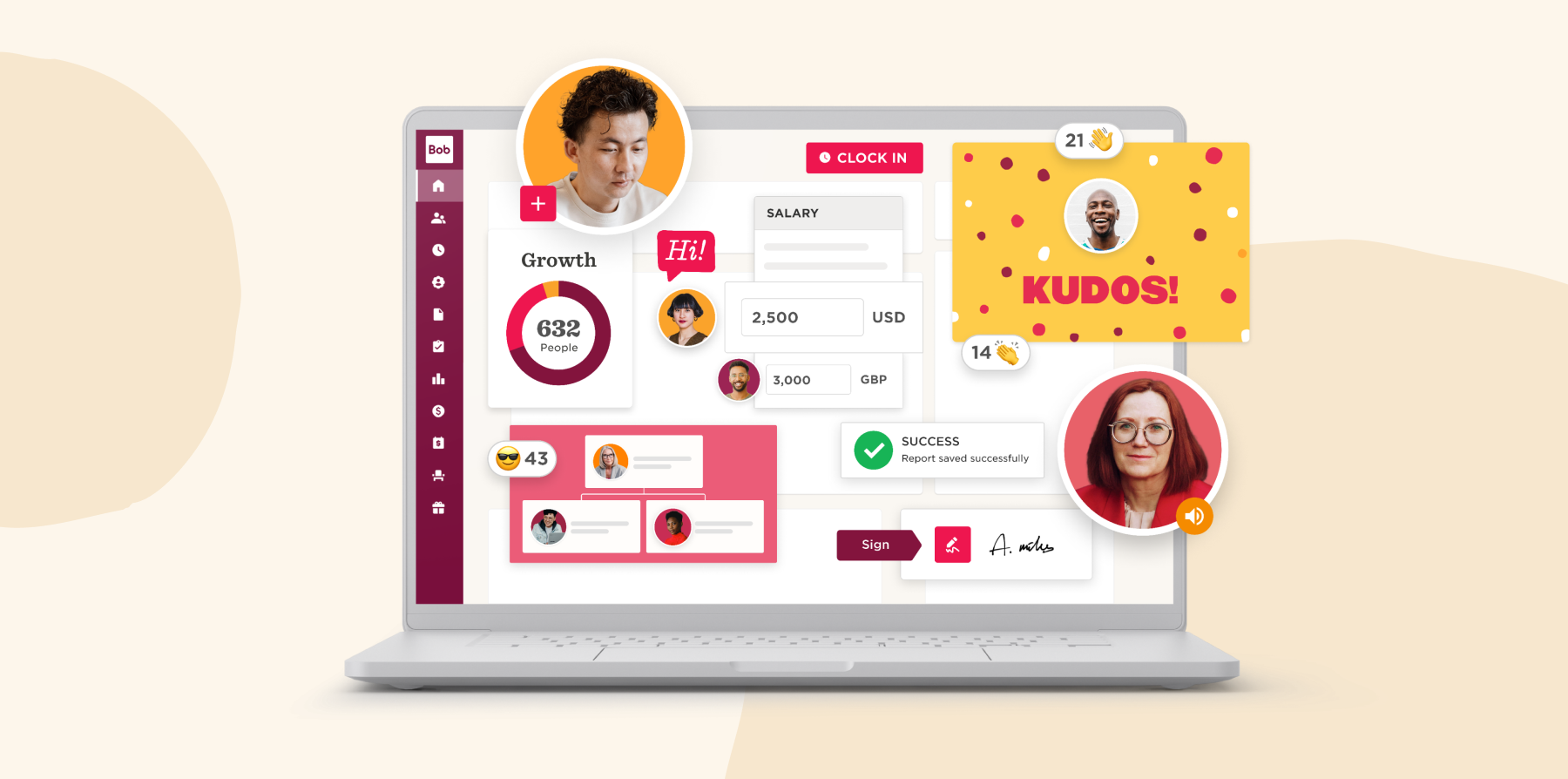
LMS features:
- Course builder: Create engaging courses using various media formats like videos and PDFs
- Personalized training: Tailor learning experiences to individual roles and career paths
- Dynamic learning: Offer interactive quizzes and tests to increase engagement and reinforce learning
- Measurable insights: Utilize dedicated dashboards and reports to gain insights into metrics like enrollment, course completion, and engagement
- Content integrations: Integrate with third-party content providers like Udemy, LinkedIn Learning, and Go1 to complement your existing course catalog
Other key features:
- Core HR: Manage team member data and automate common daily HR tasks
- Onboarding: Provide new joiners with a seamless introduction to the company through structured workflows and personalized experiences
- Time and Attendance: Track hours, manage schedules, and monitor attendance to ensure accurate paychecks
- Compensation: Plan and manage salaries, bonuses, and benefits
- Payroll Hub: Integrate with various payroll systems to streamline payroll processing and reduce administrative workload
- Hiring: Simplify recruitment processes by managing job postings, applications, and candidate communications
- UK Payroll: Handle payroll operations specific to the UK
- Time Off: Manage leave requests, track balances, and ensure proper staffing levels
- Surveys: Gather feedback through customizable surveys to gauge satisfaction and identify areas for improvement
- Performance: Conduct performance reviews, set goals, and monitor progress to support development
- People Analytics: Gain insights into your team trends and metrics
- Your Voice: Provide a platform for people to report concerns or misconduct confidentially
- Workforce Planning: Plan and manage current and future workforce needs to align with business objectives
- Sandbox: Test and optimize changes in a safe environment without affecting live data
Pricing: HiBob pricing varies based on what your team needs to succeed and grow their business.
(Features and pricing plans are based on the HiBob website and are subject to change.)
360 Learning

360Learning offers an LMS that emphasizes collaborative learning for all team members. Notable features include course authoring tools, content integrations, and analytics to track learner progress. You can also integrate 360Learning directly with HiBob to maximize your learning tools.
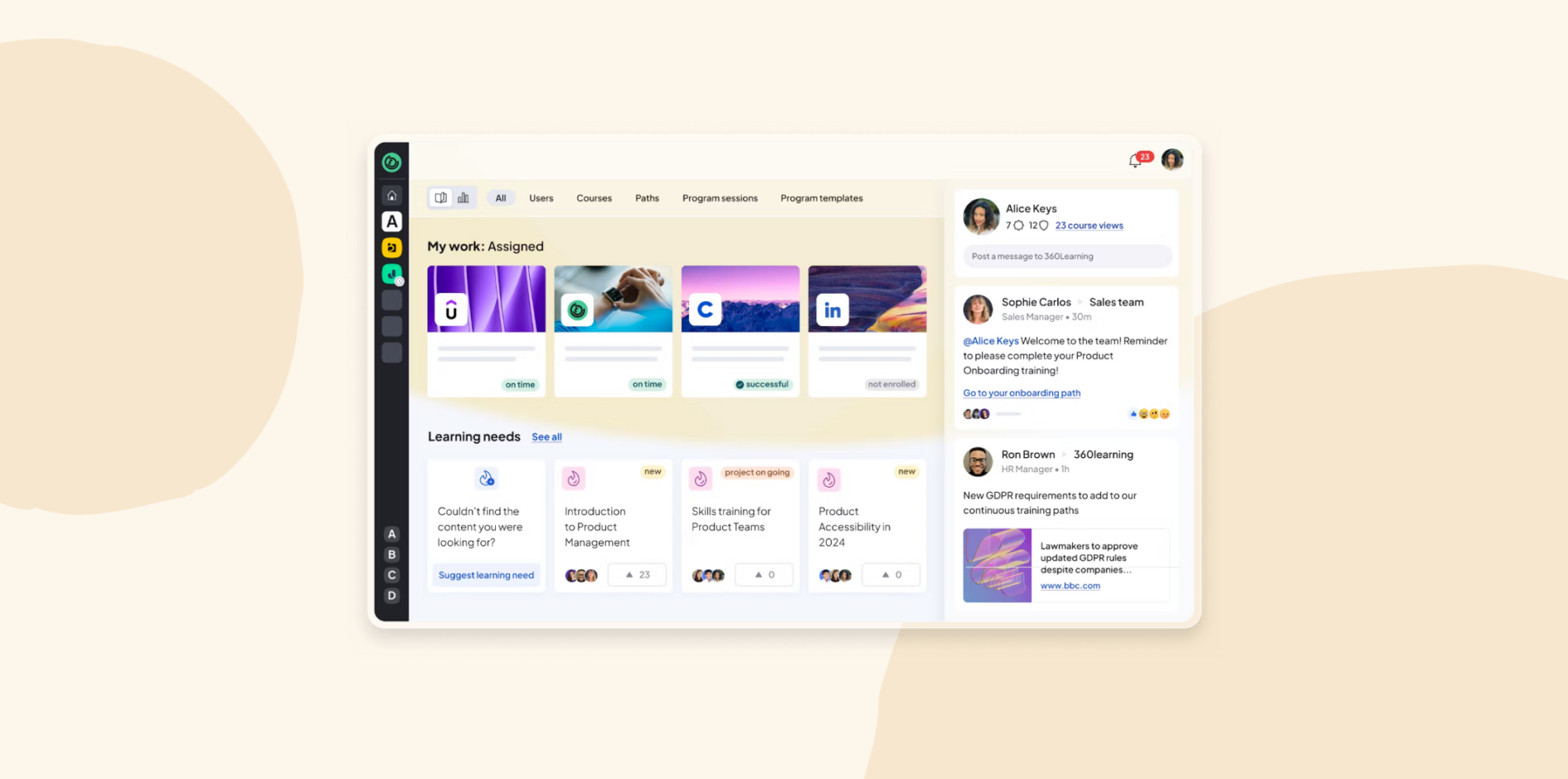
Key features:
- Facilitate the creation of courses with course authoring tools
- Offer multilingual support for global teams
- Monitor learner progress and course effectiveness with analytics
- Automatically assign training to new joiners
Pricing:
- Team: $8/mo per user
- Business: Pricing is not publicly available
(Features and pricing plans are based on the 360 Learning website and are subject to change.)
Absorb LMS

Absorb LMS offers AI-powered LMS features to support training and development. Organizations can create, manage, and deliver learning experiences across various devices. The platform offers pre-built content, course authoring, social learning, and personalized workflows.
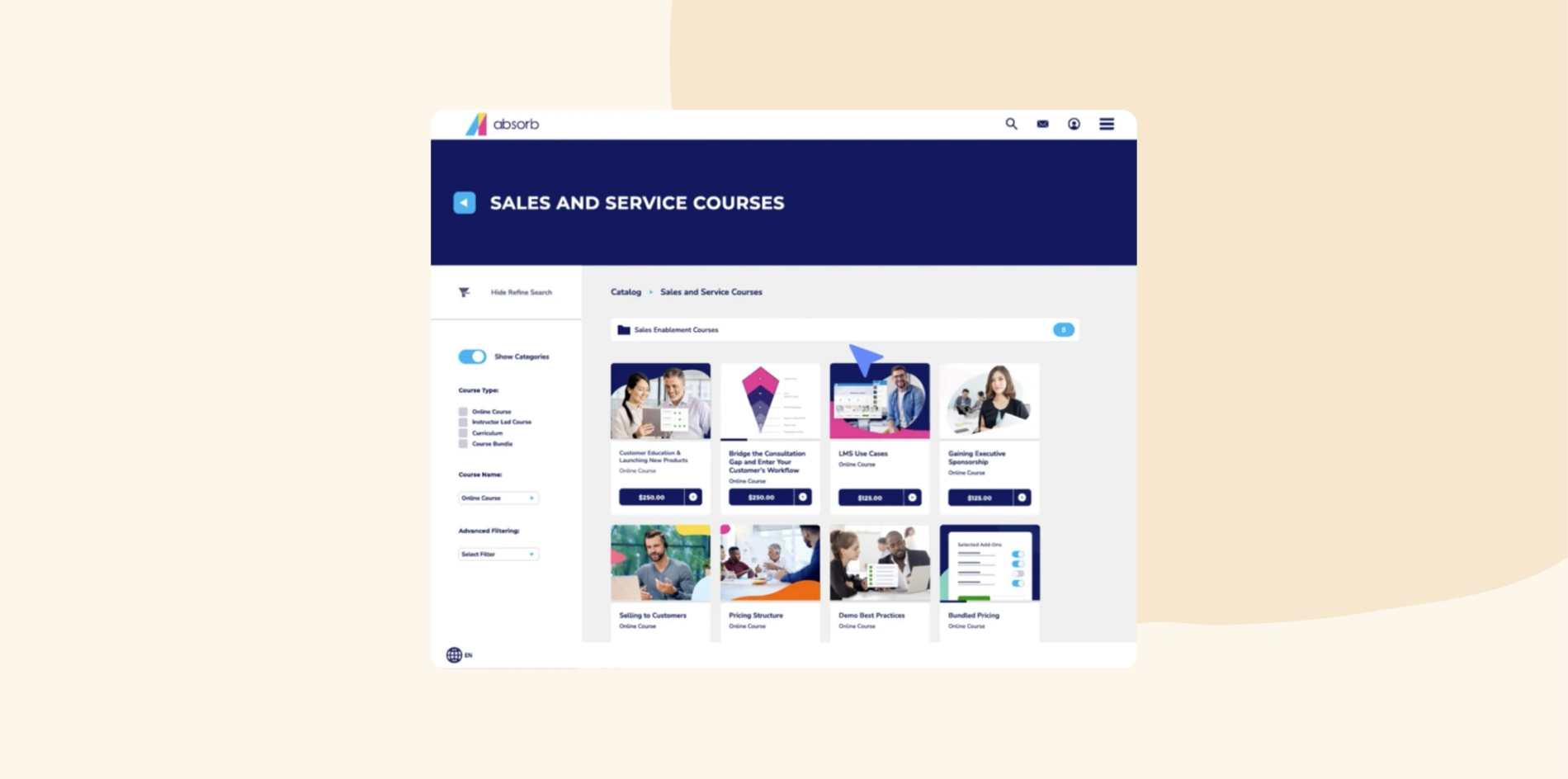
Key features:
- Develop courses using different media formats
- Offer training accessible on smartphones and tablets
- Track learner progress and measure training effectiveness
- Sell courses directly through the platform
Pricing: Pricing isn’t available online.
(Features and pricing plans are based on the Absorb LMS website and are subject to change.)
BrainCert

BrainCert is a training platform that combines learning management, virtual classrooms, and e-commerce capabilities. It enables organizations to create courses and assessments for learners. BrainCert also allows people to host sessions in virtual classrooms for global reach.
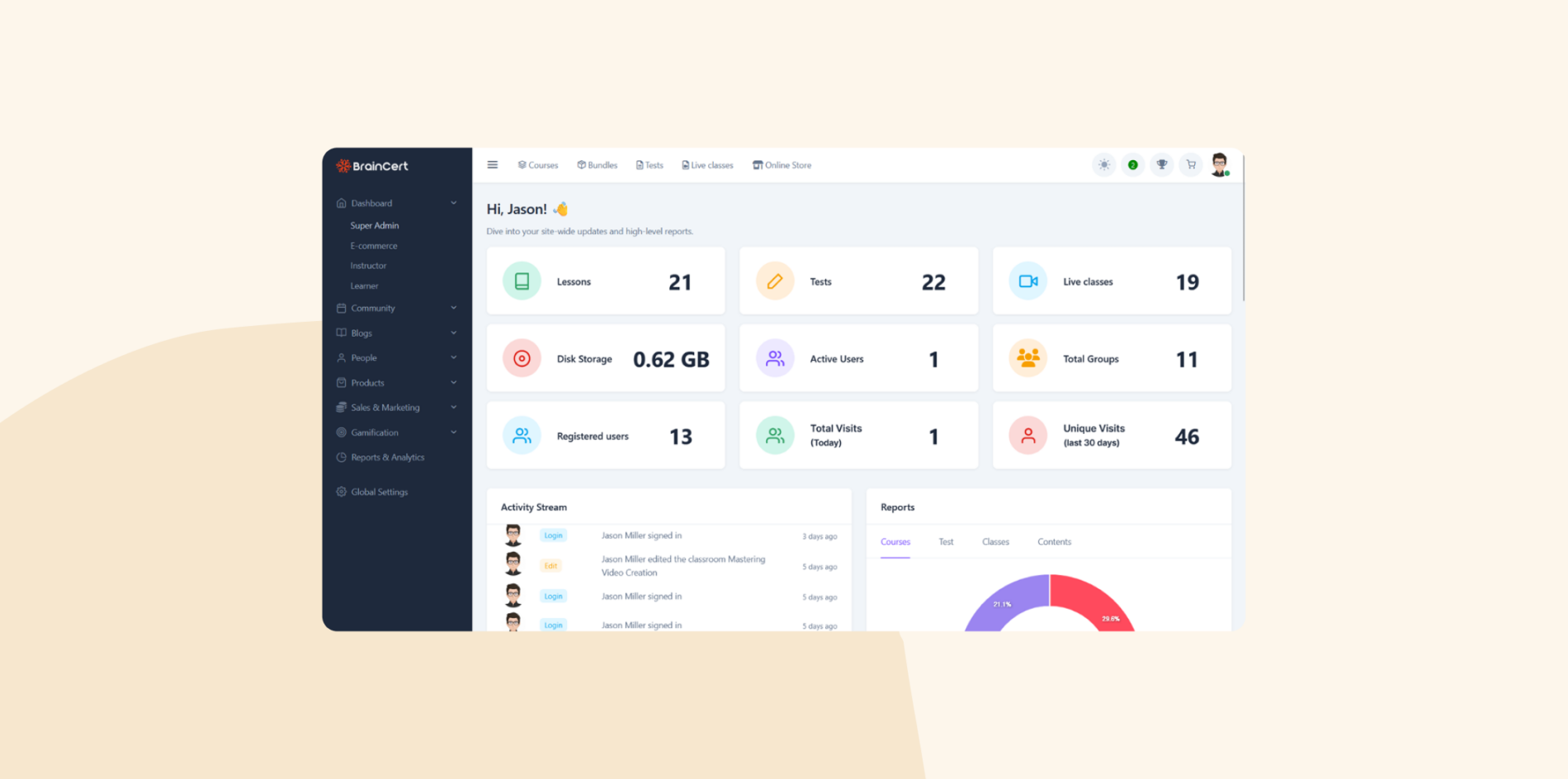
Key features:
- Develop courses with multimedia content
- Conduct live classes in virtual classrooms
- Create tests to evaluate learner progress
- Introduce gamification through badges and leaderboards
Pricing:
- Pro: $30/mo
- Elite: $75/mo
- Growth: $150/mo
(Features and pricing plans are based on the BrainCert website and are subject to change.)
Coassemble

Coassemble is a learning management system to create and deliver online training. Leaders can develop interactive courses using AI to streamline the course creation process. Learners directly access materials without needing to log in or create any accounts for an app.
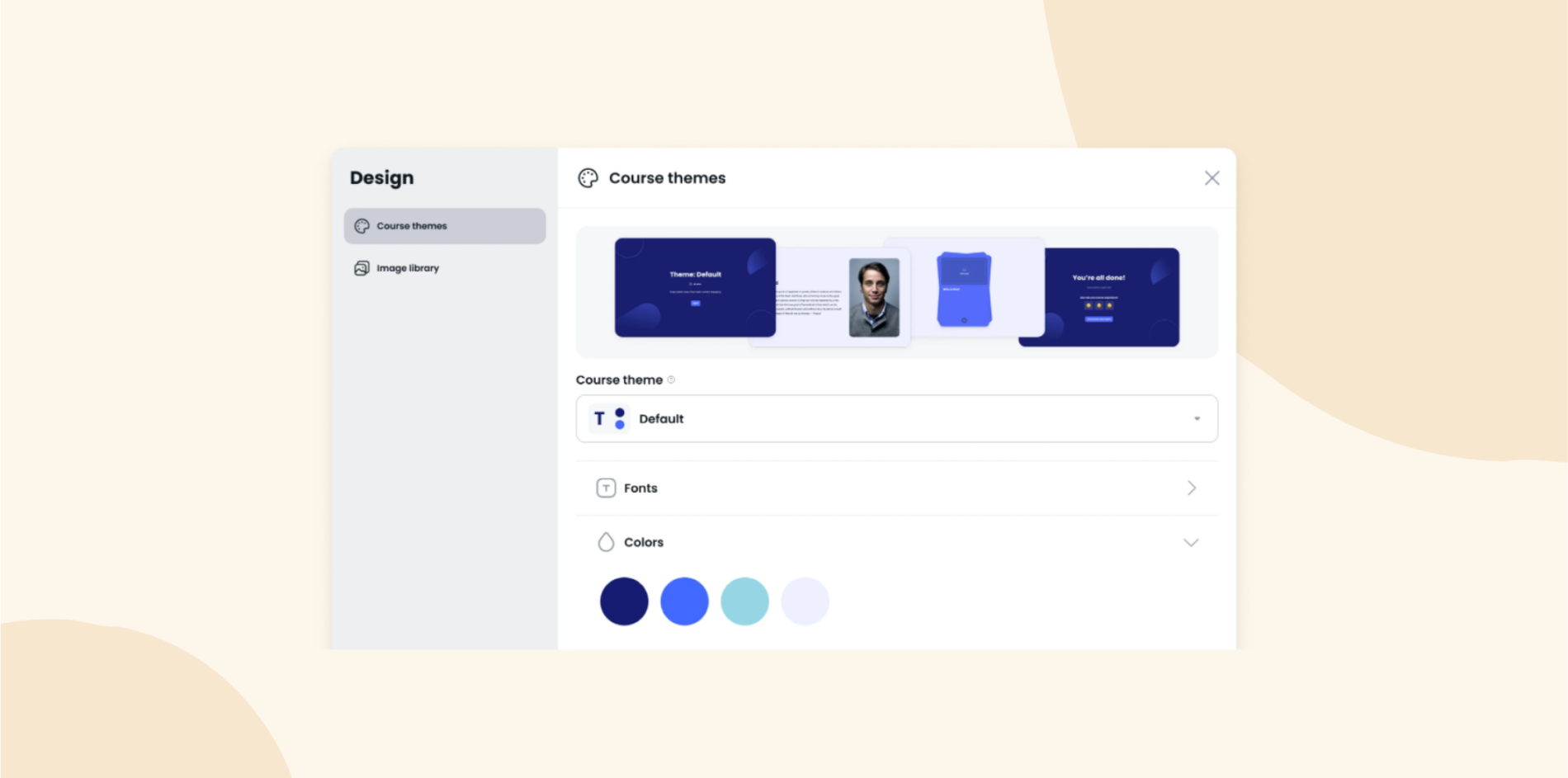
Key features:
- Use AI to convert documents into interactive courses
- Deliver training on any device without the need for additional apps or logins
- Access in-app data to monitor progress
- Adjust colors and fonts for all courses
Pricing:
- Free: $0
- Solo: $20/mo
- Team: $30/mo
- Business: $50/mo
(Features and pricing plans are based on the Coassemble website and are subject to change.)
Continu

Continu provides an LMS that streamlines training, onboarding, and upskilling. It enables HR leaders to customize learning experiences tailored to different departments, teams, and locations. They can also track progress using analytics within the platform.

Key features:
- Develop interactive courses for different roles
- Use AI-powered recommendations to personalize learning paths
- Connect with tools like Slack, Zoom, and Google Workspace
- Provide training materials accessible on any device
Pricing: Pricing isn’t available online.
(Features and pricing plans are based on the Continu website and are subject to change.)
Cypher Learning

CYPHER Learning uses AI-powered tools to deliver a platform that combines learning management, personalized training experiences, and course creation capabilities. Organizations can build tailored learning paths, automate administrative workflows, and incorporate built-in gamification elements.
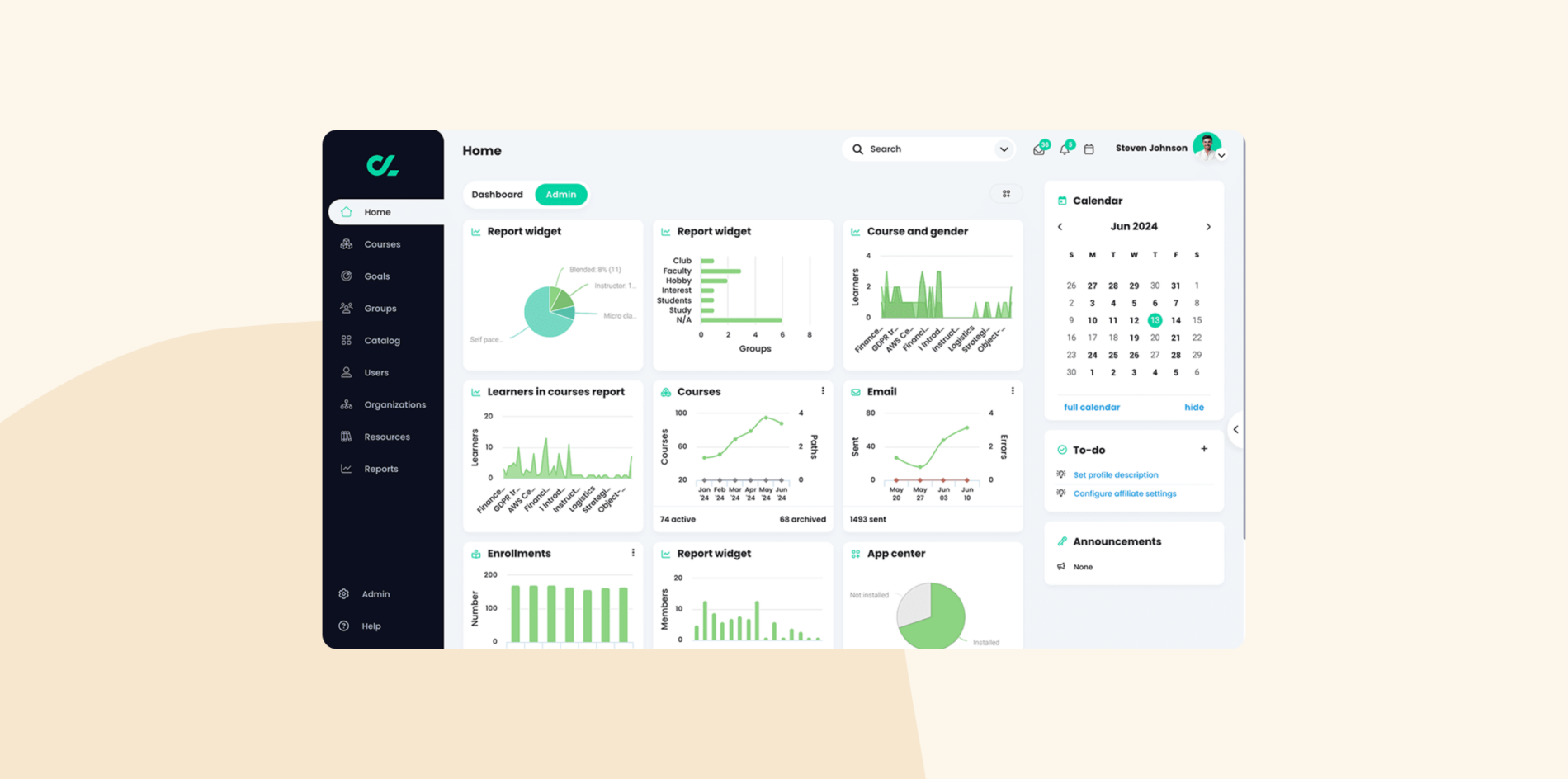
Key features:
- Develop courses with multimedia content
- Personalize learning paths to individual roles and career goals
- Automate admin tasks like enrollment and reporting
- Enhance learner engagement through badges, leaderboards, and rewards
Pricing: Pricing isn’t available online.
(Features and pricing plans are based on the CYPHER Learning website and are subject to change.)
D2L Brightspace

D2L Brightspace provides a learning management platform to create personalized learning experiences. It supports educators and learners across various educational levels and corporate training environments. Users can also access D2L Lumi, their AI assistant for course creation.
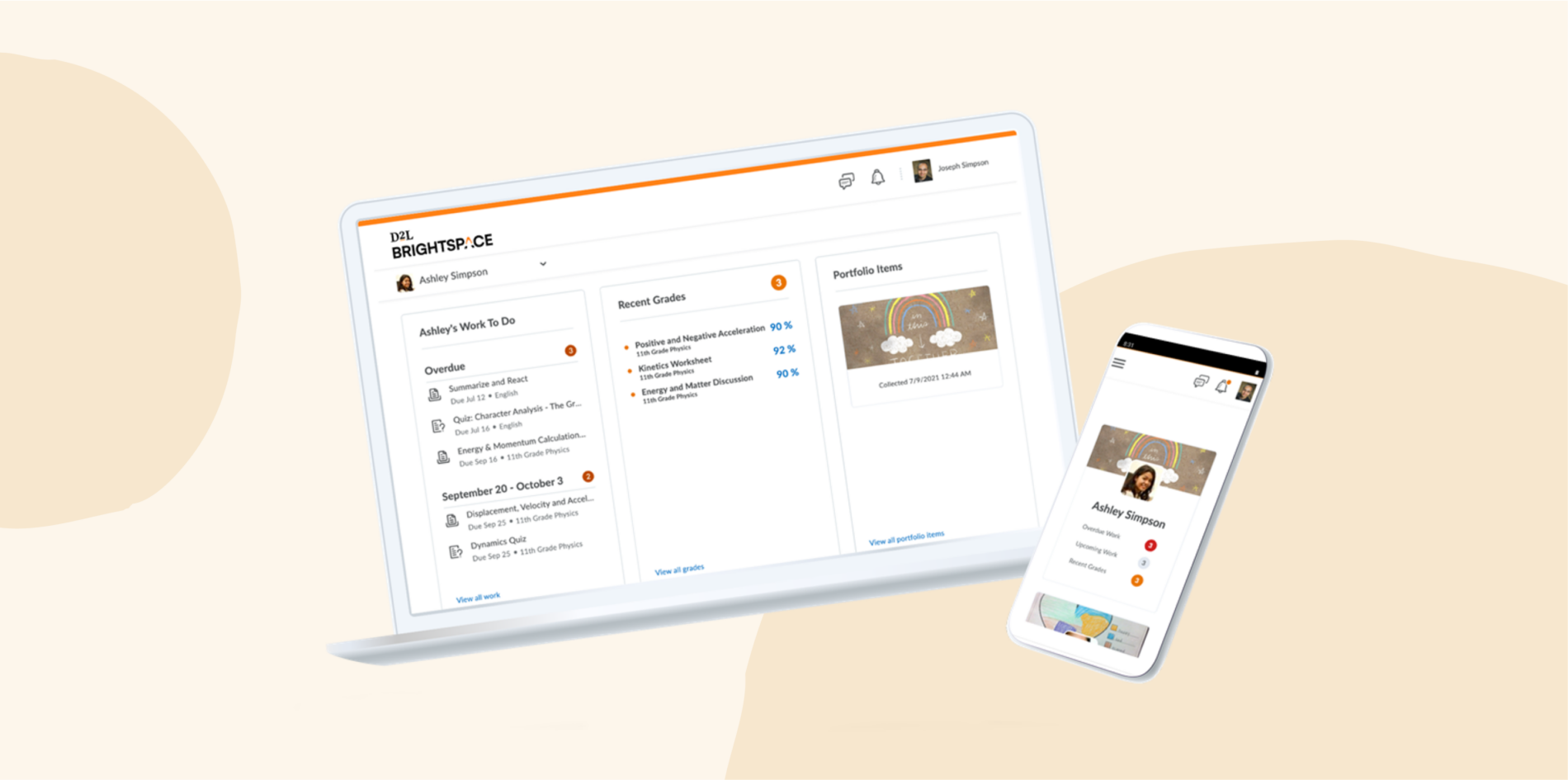
Key features:
- Develop and organize courses with customizable content and templates
- Utilize quizzes, assignments, and rubrics to evaluate learner progress
- Gain insights into learner performance through detailed reports
- Access learning materials and participate in courses via mobile devices
Pricing: Pricing isn’t available online.
(Features and pricing plans are based on the D2L website and are subject to change.)
Deel Engage

Deel Engage is an AI-powered LMS designed to streamline the creation and delivery of training programs. Organizations can use it to develop courses with drag-and-drop features and track learner progress directly within the app.
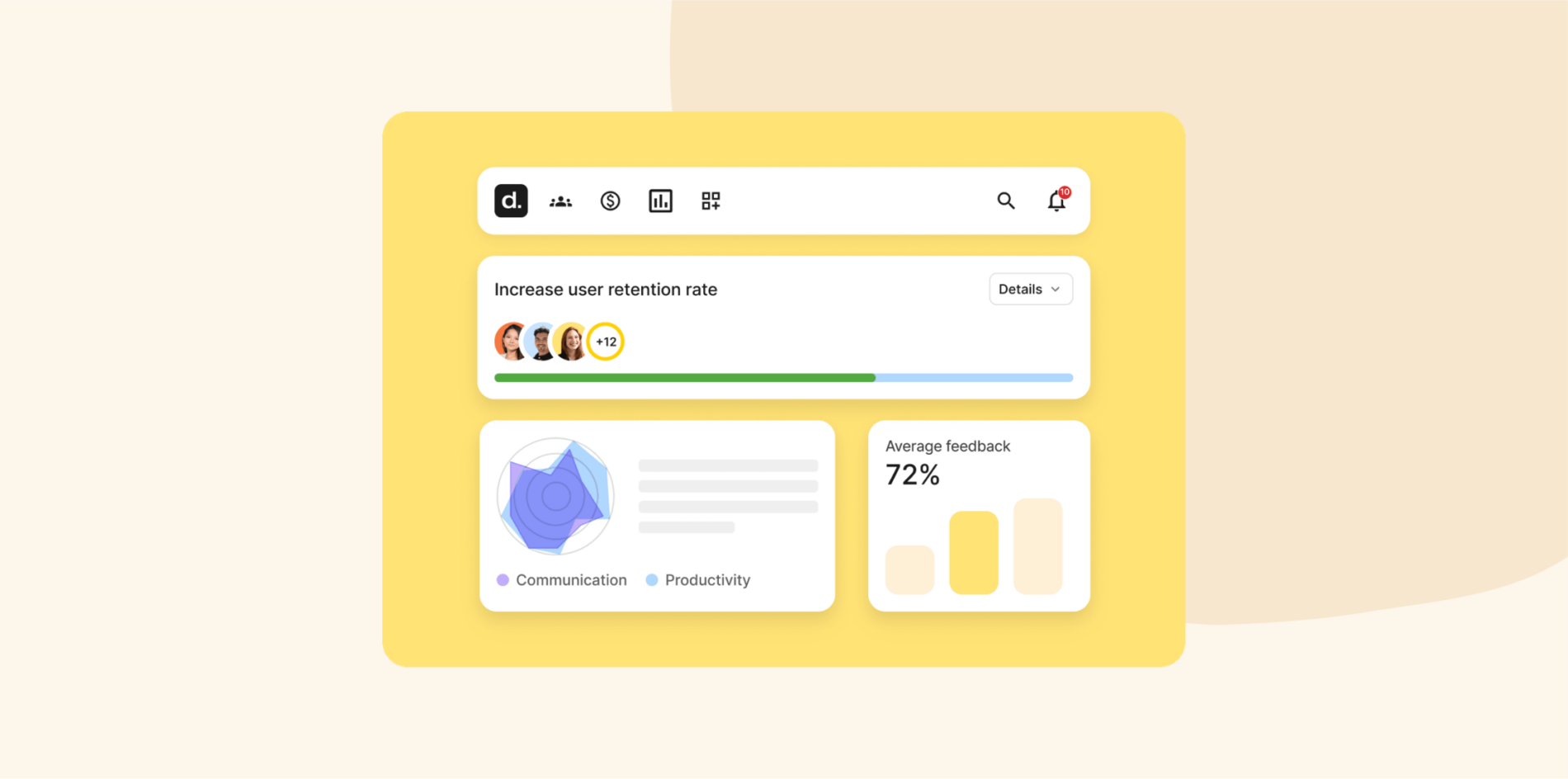
Key features:
- Use AI to build courses
- Combine learning formats like images, quizzes, tasks, videos, text, and documents
- Offer self-directed learning so people can study at their own pace
- Monitor mandatory training completions and certifications to ensure compliance
Pricing: $20/mo
(Features and pricing plans are based on the Deel Engage website and are subject to change.)
Docebo

Docebo offers an AI-automated learning management system to handle corporate training and development. The platform can deliver personalized learning paths and automate administrative tasks to save time for HR teams. It encourages collaboration through tools like social learning and gamification.

Key features:
- Create and manage skill profiles based on the specific roles, skill sets, and competencies
- Deliver content based on learner behavior and performance data
- Encourage peer-to-peer knowledge sharing with discussion forums
- Allow learners to engage with training materials on any device through an app
Pricing: Pricing isn’t available online.
(Features and pricing plans are based on the Docebo website and are subject to change.)
EasyLMS

Easy LMS is a cloud-based LMS that can streamline training for team members, customers, and business partners. Small businesses can use it to create continuous education training, onboarding courses, and more. EasyLMS allows teams to store previous PowerPoint, PDF, or video training materials for future reference.
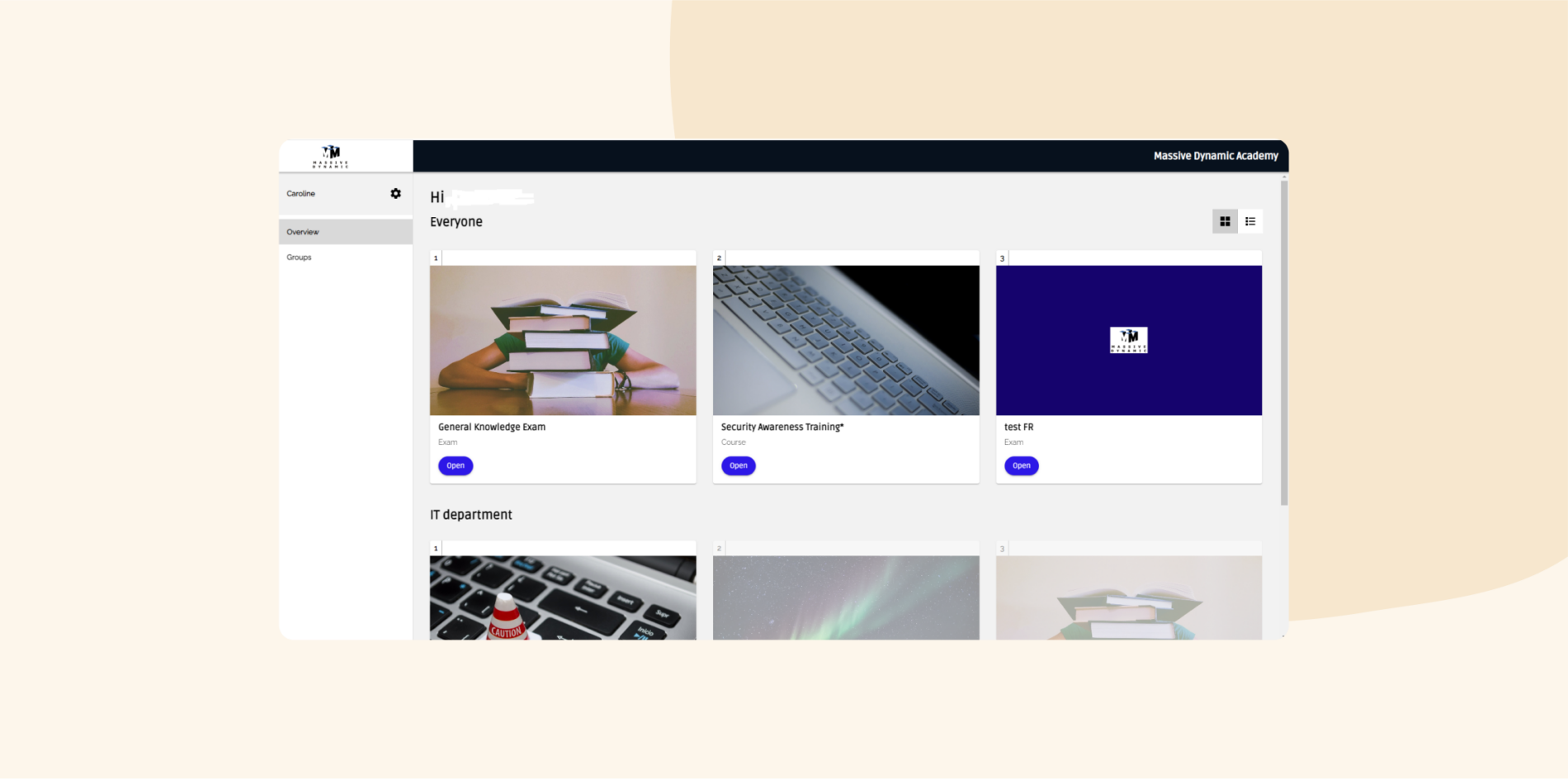
Key features:
- Develop courses with text, images, audio, and video
- Incorporate exams and quizzes with multiple question types
- Automatically generate customized certificates upon course completion
- Enable learners to access training materials on mobile devices
Pricing:
- Business Owl + Academy: $105/mo
- Corporate Owl + Academy: $159/mo
- Enterprise Owl: $275/mo
(Features and pricing plans are based on the EasyLMS website and are subject to change.)
Gurucan

Gurucan is an LMS tailored to digital businesses and content creators. Users can launch online courses, conduct live sessions, and offer memberships through a unified platform. Small businesses can use the platform to take more control over the look and feel of their training apps.

Key features:
- Create multimedia courses with videos, texts, and quizzes
- White-label mobile apps
- Host live streaming sessions directly through the platform
- Monitor user engagement
Pricing:
- Expert: $99/mo
- Pro: $149/mo
- Guru: $199/mo
(Features and pricing plans are based on the Gurucan website and are subject to change.)
iSpring Learn

iSpring Learn is a cloud-based learning management system that offers compliance training, product training, on-the-job training, team member performance appraisals, and more. The platform supports mobile access so learners can engage with content anywhere.
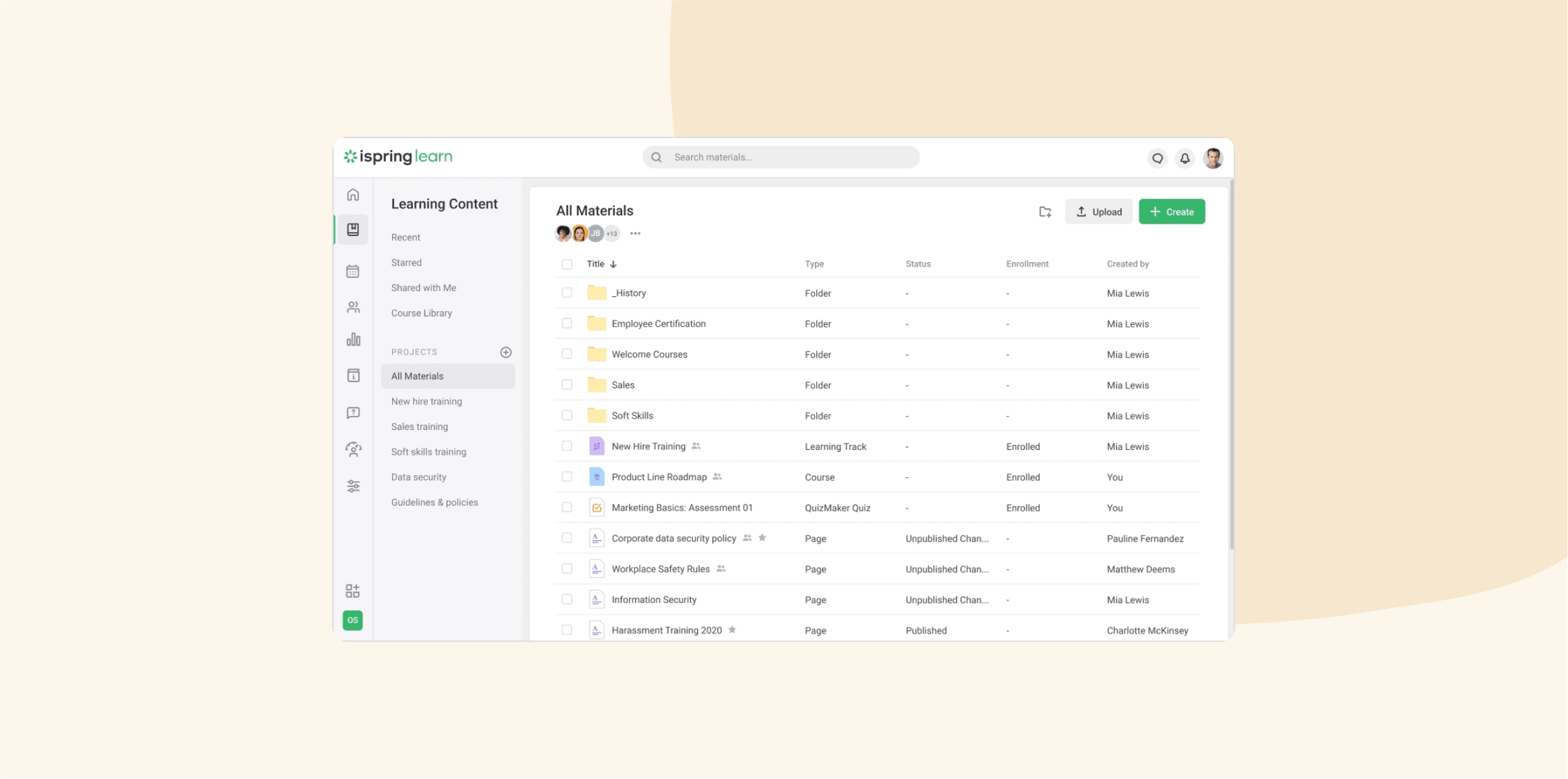
Key features:
- Create interactive courses, quizzes, and simulations
- Organize courses into structured paths
- Monitor student progress with comprehensive reports
- Connect with external apps
Pricing:
- iSpring Suite: $770/yr
- iSpring Suite Max: $970/yr
- iSpring Suite Premium: $1,970/yr
(Features and pricing plans are based on the iSpring Learn website and are subject to change.)
LearnUpon

LearnUpon offers an LMS that supports training for team members, customers, business partners, and more. Small businesses can integrate learning experiences for customers directly within their product onboarding. They can also enable remote training for local and global teams.
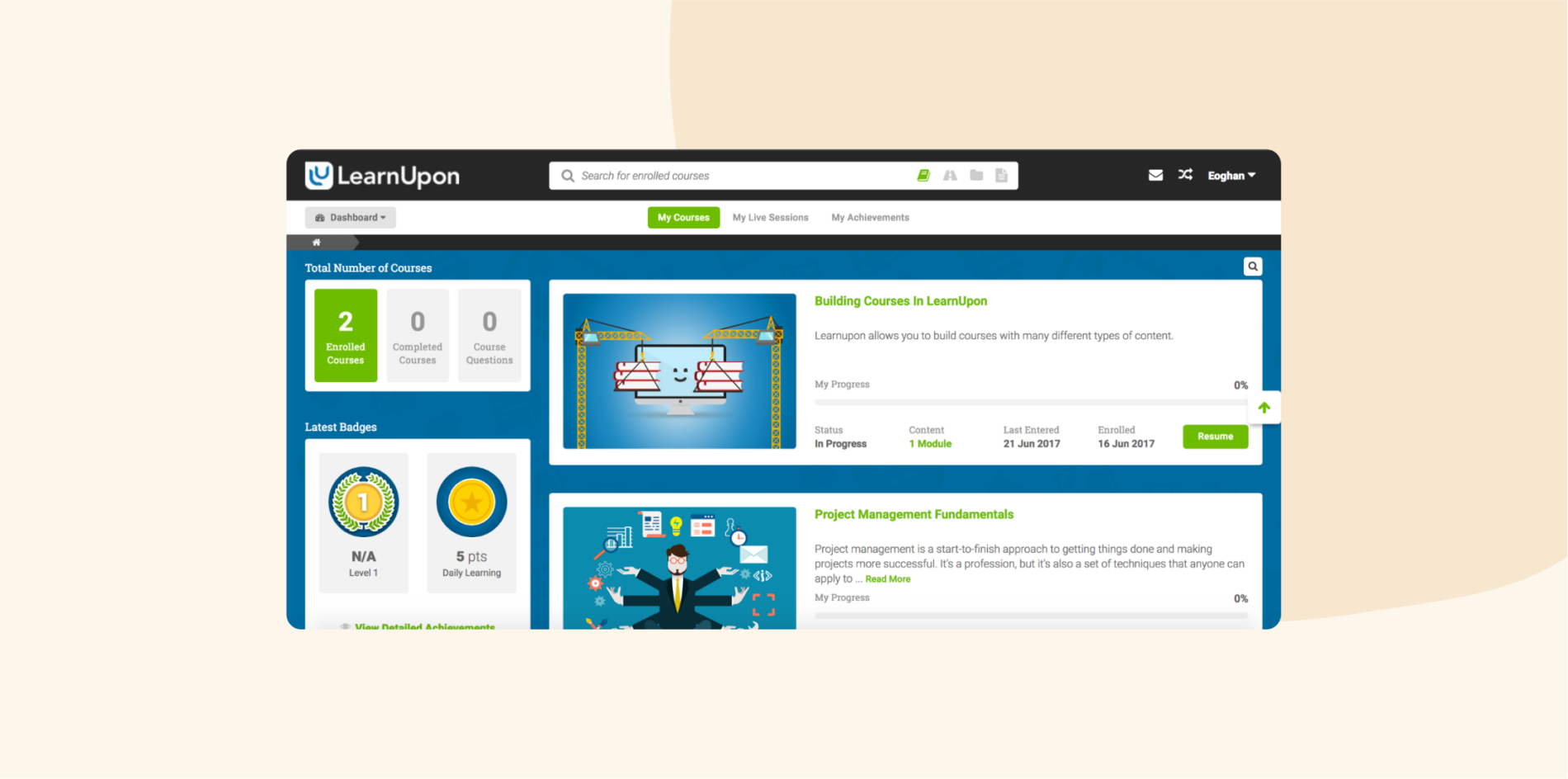
Key features:
- Produce content in forms like webinars and instructor-led training, SCORM and xAPI files, documents, and videos
- Serve on-demand training accessible anywhere
- Automate tasks like user creation and enrollments.
- Embed a LearnUpon course on your site or platform of choice
Pricing: Pricing isn’t available online.
(Features and pricing plans are based on the LearnUpon website and are subject to change.)
LearnWorlds

LearnWorlds offers a learning management system that focuses on course creation to develop and sell online. Small businesses can use it to create learning experiences so they can upskill teams or offer unique training programs to customers.
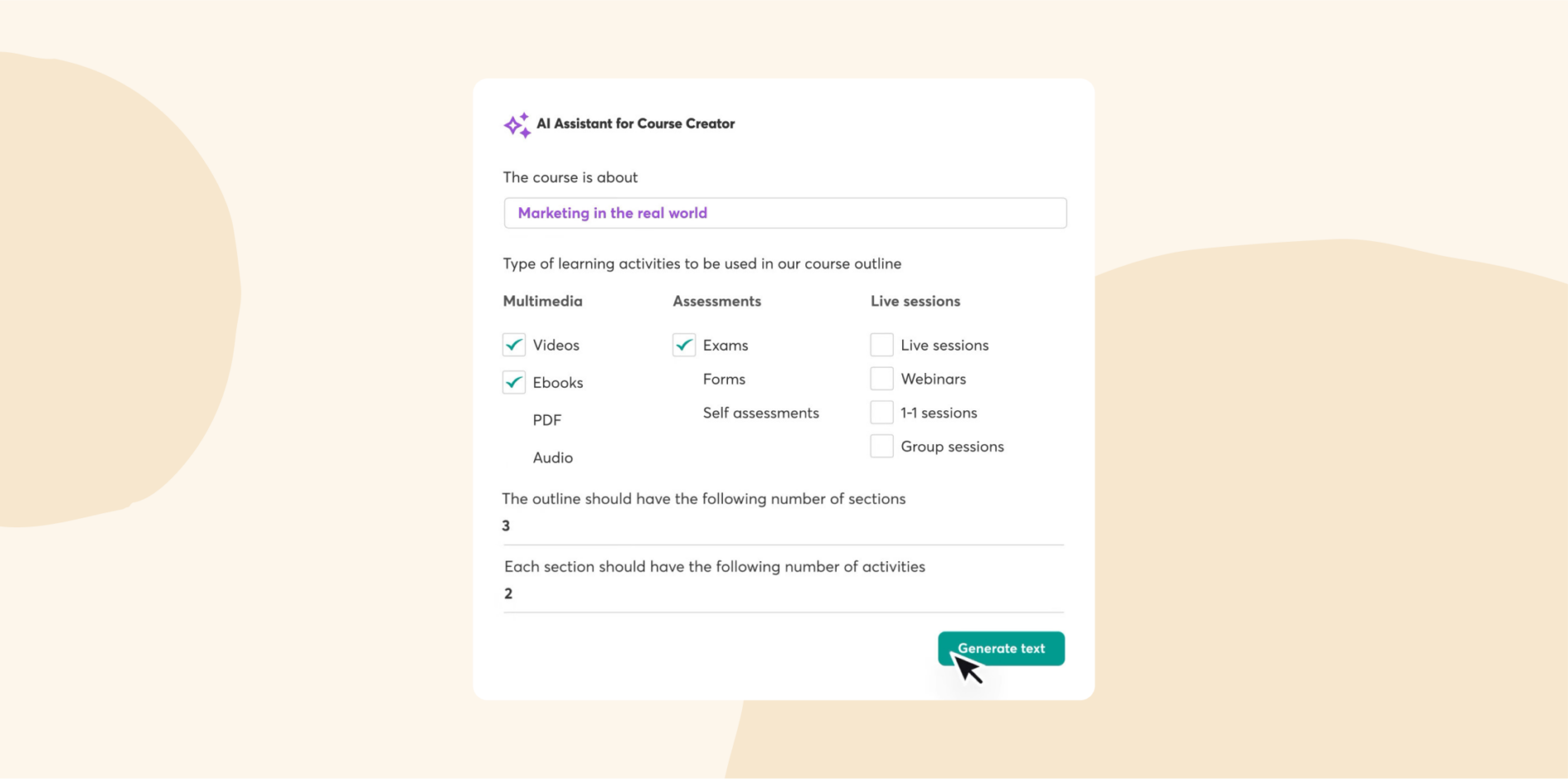
Key features:
- Design courses using videos, quizzes, and multimedia
- Access over 50 site templates for branded training sites
- Create courses faster with an AI assistant
- Empower HR and L&D teams to track learner progress
Pricing:
- Starter: $29/mo + $5 per course sale
- Pro Trainer: $99/mo
- Learning Center: $299/mo
- Learning Center + Mobile App: $598/mo
(Features and pricing plans are based on the LearnWorlds website and are subject to change.)
Litmos

Litmos provides an LMS for small businesses to train local and remote team members. The platform allows leaders to launch training programs in over 35 languages and learners can access their materials 24/7 from any location in the world.
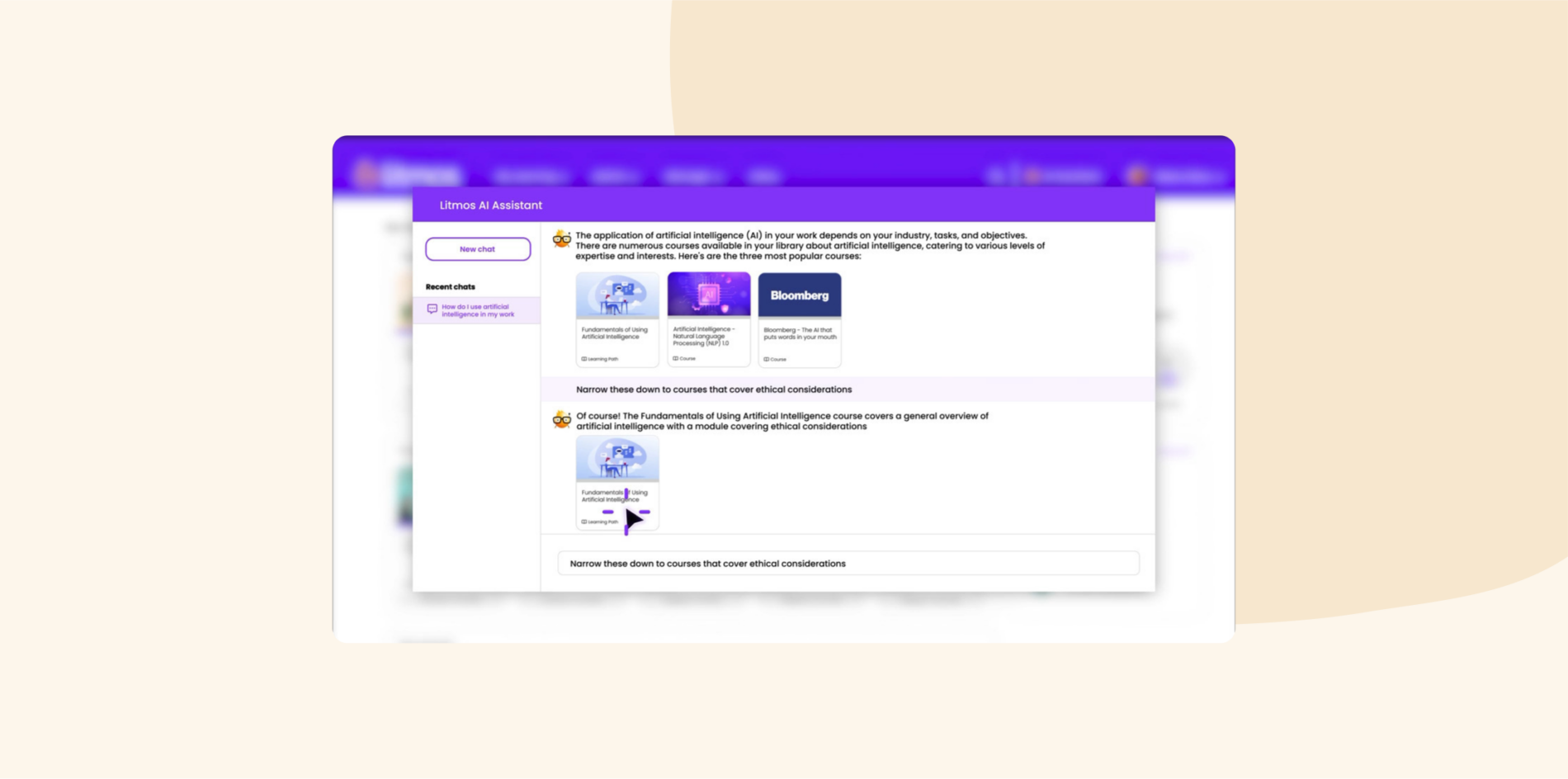
Key features:
- Develop mobile-responsive courses directly within the LMS
- Utilize AI to assign courses and track progress
- Leverage machine learning to analyze learner sentiment and performance in video assignments
- Enable learners to access training materials anytime, anywhere with offline capabilities
Pricing: Pricing isn’t available online.
(Features and pricing plans are based on the Litmos website and are subject to change.)
Moodle

Moodle is an open-source learning management system where learners can access their materials on any device and browser and complete training on the go. Though it’s open-source, Moodle follows specific security protocols to protect information when deployed on a private secure cloud or server.
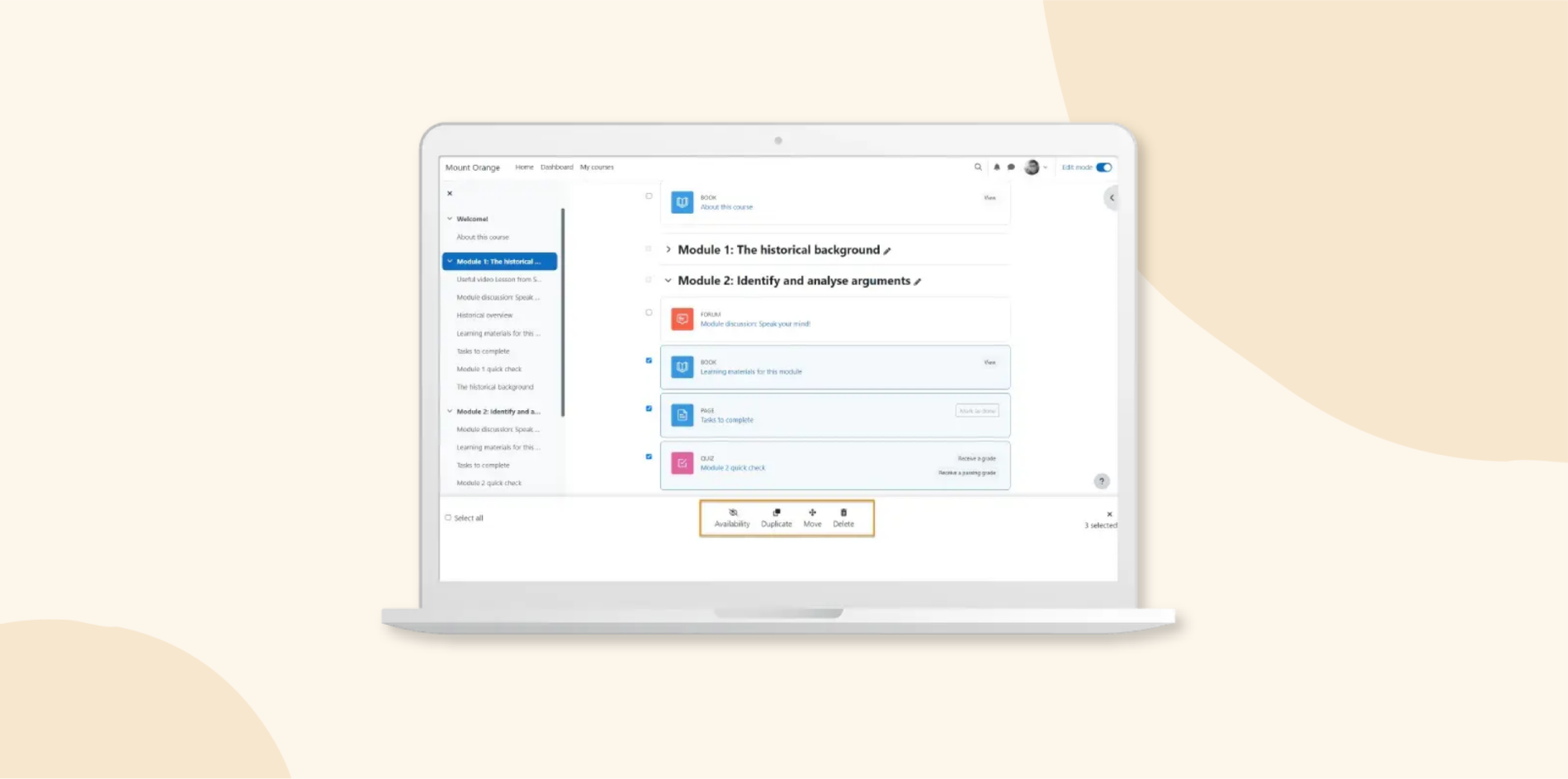
Key features:
- Control everything from data privacy and security to your site functionality
- Access learning materials on any device through the Moodle Mobile App
- Add your own brand colors and logo with custom themes
- Leverage Moodle’s AI integration tools to streamline workflows
Pricing: Pricing isn’t available online.
(Features and pricing plans are based on the Moodle website and are subject to change.)
TalentCards

TalentCards offers a mobile-focused LMS designed to deliver microlearning experiences to deskless team members. Organizations can create small, digestible training modules accessible via smartphones. They combine flashcards, images, and quizzes to deliver information to mobile workers.
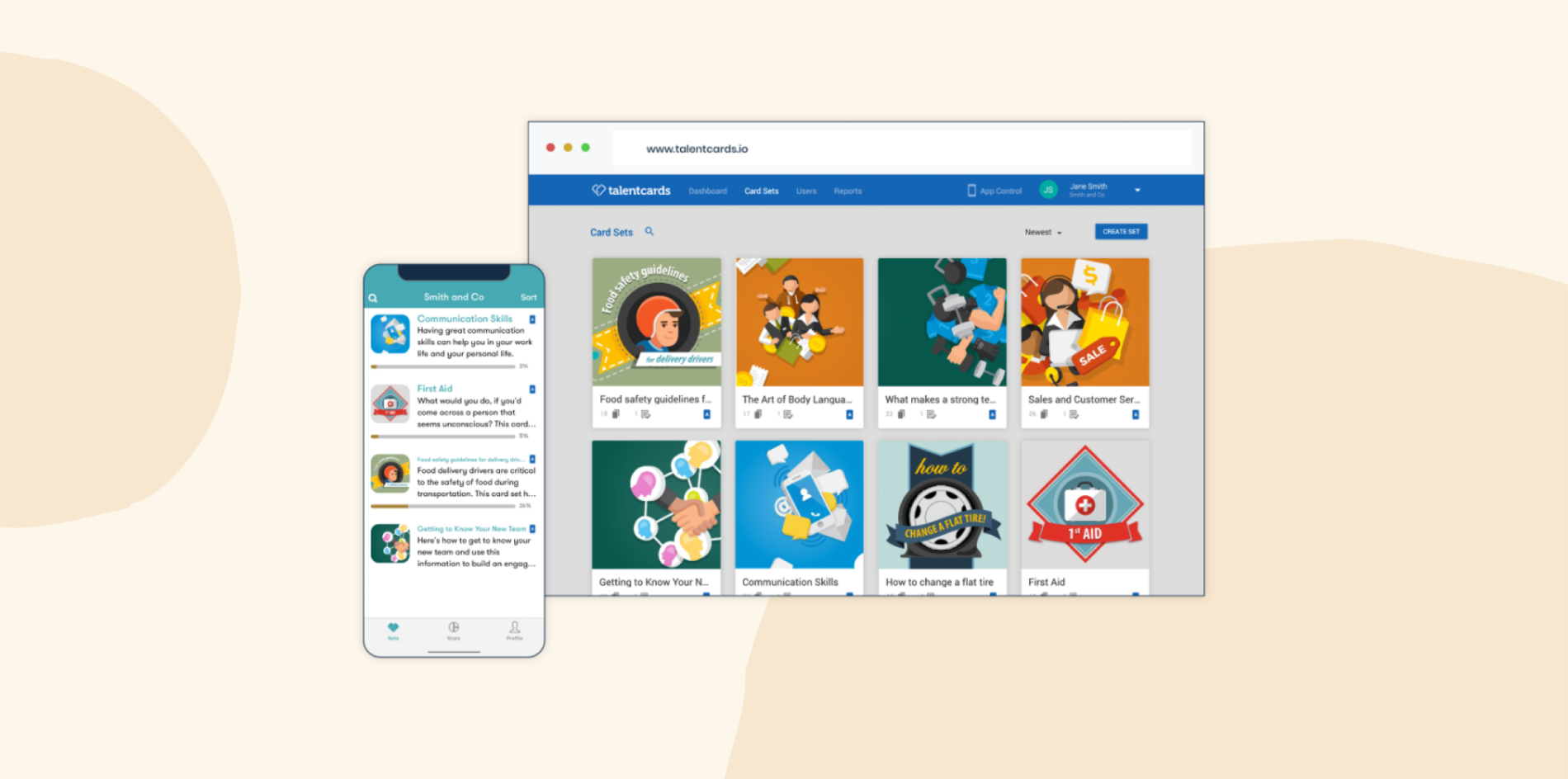
Key features:
- Develop concise training materials using text, images, audio, and video
- Allow learners to download content for offline viewing
- Utilize algorithms that adjust content delivery based on individual performance
- Automatically create microlearning courses with AI by inputting a training topic
Pricing:
- Free: $0
- Standard: $50/mo
- Premium: $75/mo
(Features and pricing plans are based on the TalentCards website and are subject to change.)
Talent LMS

TalentLMS offers a cloud-based learning management system to handle training delivery for growing businesses. Leaders can use the built-in AI assistant to create various aspects of the courses. Small businesses can create courses for career development training, onboarding, sales training, and customer training.
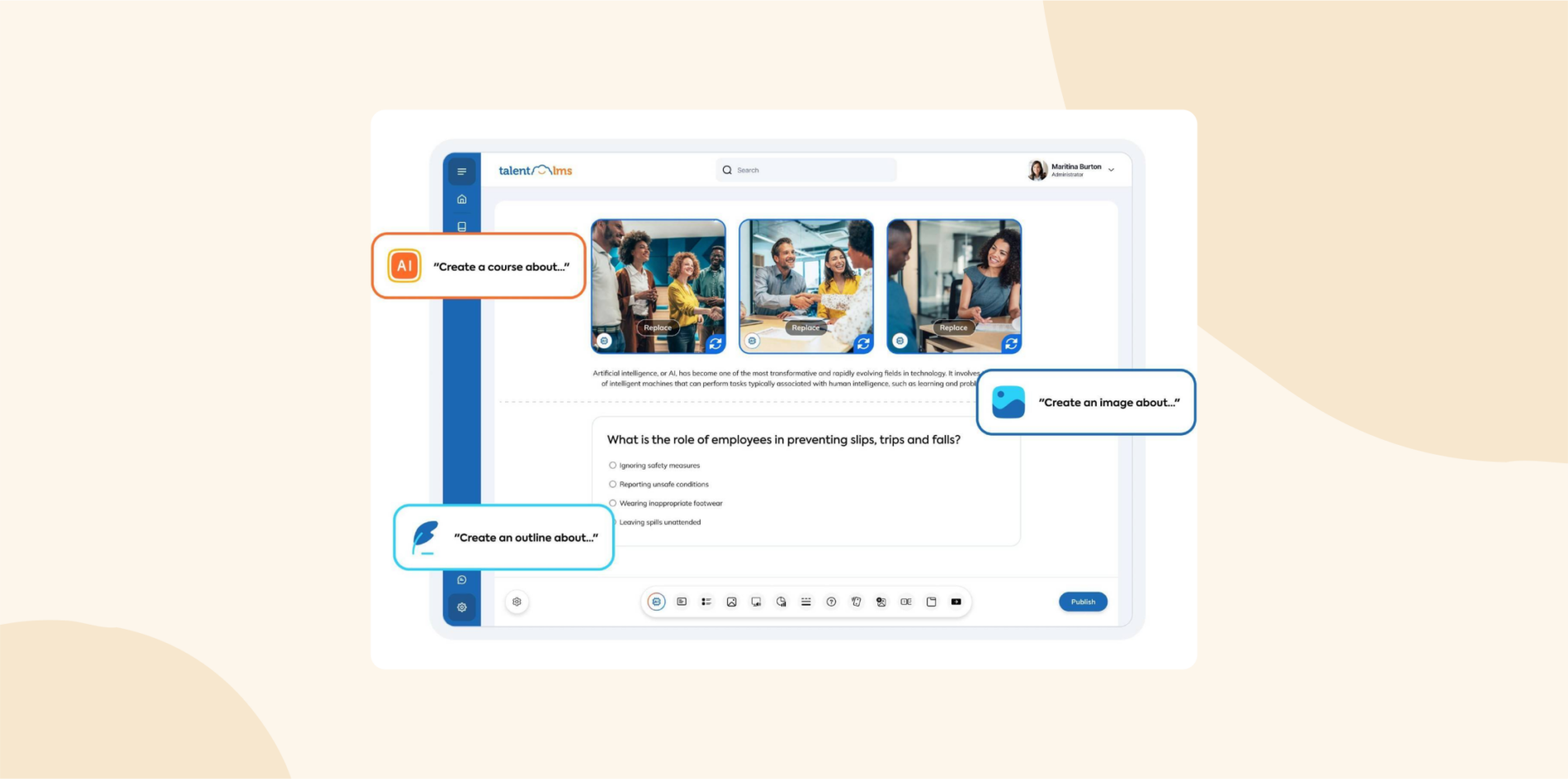
Key features:
- Use AI to generate various content types
- Add media, import internet content, or drag and drop existing courses
- Build surveys to gain insights into your learners and training
- Guide learner paths by restricting the way courses are completed
Pricing:
- Core: Starts at $119/mo
- Grow: Starts at $179/mo
- Core: Starts at $239/mo
- Enterprise: Pricing is not publicly available
(Features and pricing plans are based on the TalentLMS website and are subject to change.)
Thinkific

Thinkific provides LMS features to streamline team member training and development for mid-market to enterprise-level businesses. Leaders can use AI tools to launch programs within a few weeks. They can tailor courses for onboarding, upskilling, sales enablement, and talent development.
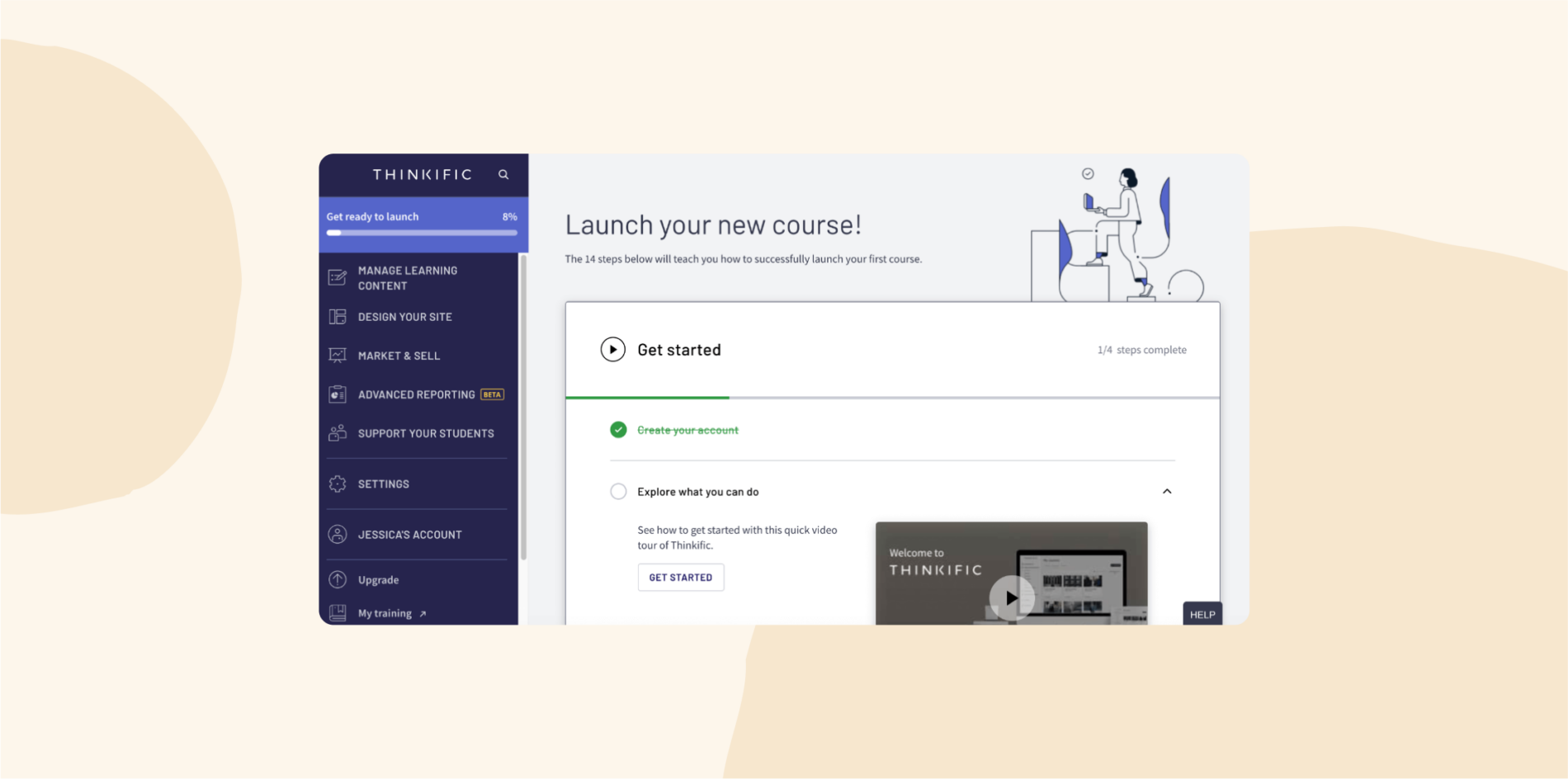
Key features:
- Develop training content with videos, quizzes, and assignments
- Use AI to streamline content creation
- Connect with existing tools and systems to create an integrated training ecosystem
- Access detailed data and insights to monitor individual progress
Pricing: Pricing isn’t available online.
(Features and pricing plans are based on the Thinkific website and are subject to change.)
Tovuti LMS

Tovuti offers a cloud-based learning management system to house, track, and automate training all from one place. Small business owners can create training materials using the built-in AI assistant. They can also save time by reusing courses, lessons, and quizzes and making bulk updates to content.
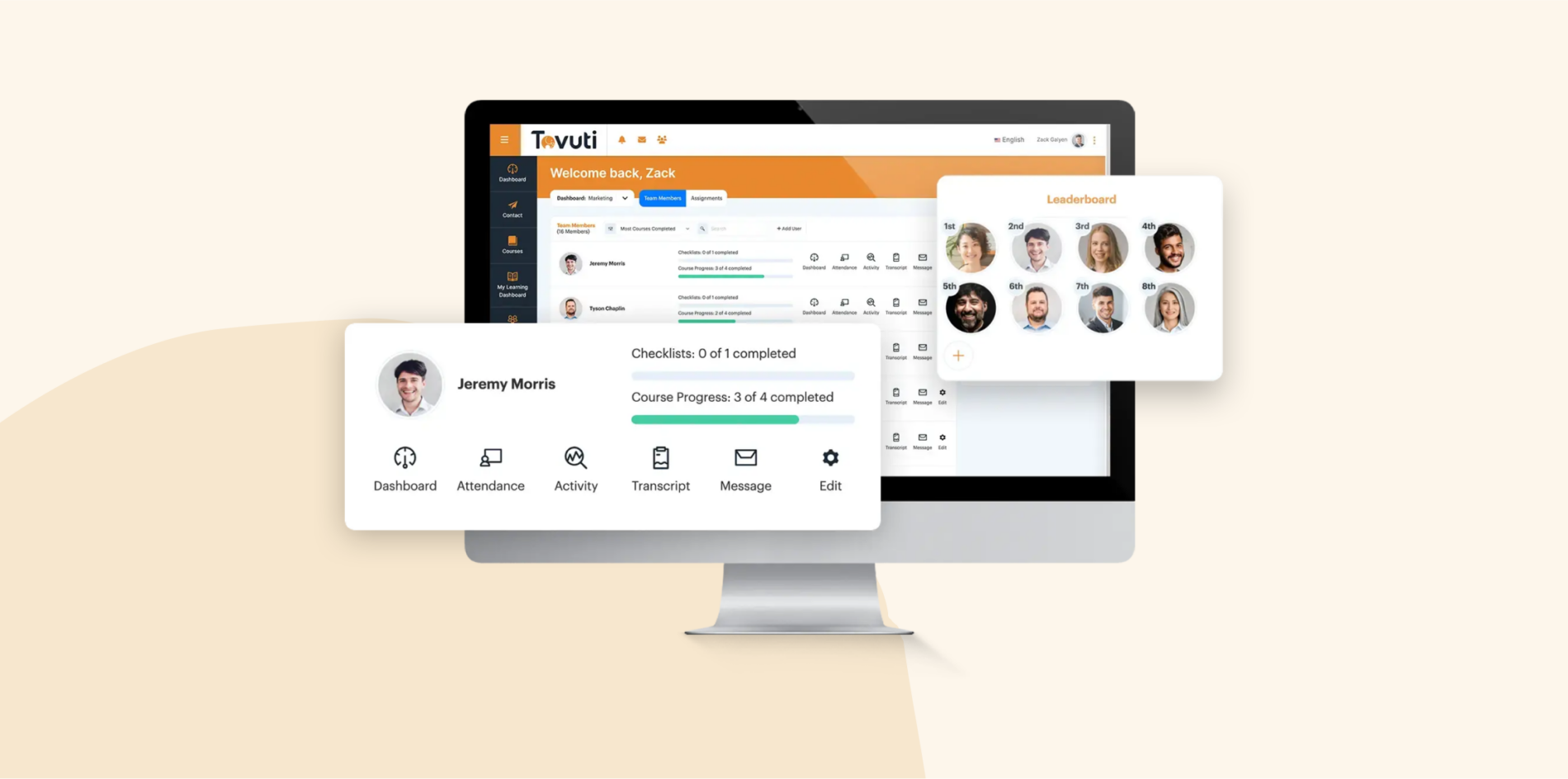
Key features:
- Create interactive content using over 40 different types of gamified content options
- Import SCORM files into the content library
- Incorporate various question formats to evaluate learner understanding and track progress
- Design customized learning journeys that include courses, activities, and assessments
Pricing: Pricing isn’t available online.
(Features and pricing plans are based on the Tovuti website and are subject to change.)
<<Made your decision? Use this LMS implementation checklist to ensure perfect execution.>>
Learning management system trends for small businesses
The LMS market constantly adapts to changing workforce expectations, industry demands, and skill gaps. HR teams in small businesses can gain a competitive edge by adopting these trends early on:
- Creating a learning culture: Modern businesses recognize that a continuous learning culture increases employee retention rates by 45 percent and engagement by 17 percent. HR teams can use LMS platforms to provide easy access to learning resources, motivate people to take charge of their personal development, and reward achievements with incentives that highlight their progress and contributions.
- Upskilling and reskilling team members: HR leaders use LMS platforms to deliver targeted courses that close key skill gaps. An LMS simplifies reskilling by offering structured retraining programs that help organizations manage recruiting and hiring costs.
- AI and automation: LMS platforms now transform training processes through AI and automation, helping HR teams identify skill gaps, automate tedious tasks, and recommend learning paths aligned with organizational goals. Small businesses adopt these tools to free limited human resources to focus on strategic initiatives.
- Personalization: Personalized learning paths continue to reshape how team members engage with training by tailoring content to roles, career aspirations, and learning preferences. These features deliver relevant, engaging experiences that improve retention and address individual needs.
Choose the best LMS for your small business
Building a strong learning and development culture within a small business increases engagement, skill growth, and a sense of unity among team members. The right LMS platform streamlines these learning processes, freeing HR leaders to focus on additional business goals.
For small businesses seeking an all-in-one solution for learning and development, consider Bob. With its user-friendly course builder, highly personalized training, and measurable insights, you can keep your team well-trained, engaged, and ready to tackle every stage of growth.
Learn more about Bob
Disclaimer: The opinions expressed here are solely those of the author and do not necessarily reflect the views of the company. Prospective users are encouraged to conduct their own research to make the best decision for their organization.
Small business LMS FAQ
Why is an LMS important for small businesses?
LMS platforms help small businesses by providing a user-friendly platform to streamline training, upskill team members, and increase engagement. Small teams use these platforms to train their people without overburdening HR resources. They also reduce recruitment costs by retaining team members through career development opportunities.
What is a learning management system used for?
HR leaders use LMS platforms to deliver and track training programs across an organization. They can create courses, assess progress, and tailor learning paths to individual needs inside the programs from anywhere in the world.
Can an LMS help with onboarding?
Yes, an LMS can significantly help onboarding by providing new joiners with a consistent and structured learning path, including training modules, company policies, and role-specific resources from day one. This accelerates their integration, increases confidence, and promotes productivity.
What are the benefits of using an LMS?
An LMS offers many benefits to small businesses by enhancing overall learning and development programs. These benefits include increased team engagement and improved retention through career growth opportunities.
Recommended For Further Reading
What are some common features of the best LMS platforms for small businesses?
The most common LMS platforms include features tailored to small business needs like integration capabilities, a user-friendly course builder, and reporting and analytics functions that track outcomes.
What is the best LMS for corporate training?
The best LMS depends on your specific business goals and needs. Many HR leaders choose Bob for corporate training due to its comprehensive approach that blends learning with core HR functions. This powerful combination supports team member growth, engagement, and perfect alignment with broader organizational goals.


From Madeline Hogan
Madeline Hogan is a content writer specializing in human resources solutions and strategies. If she’s not finishing up her latest article, you can find her baking a new dessert recipe, reading, or hiking with her husband and puppy.










